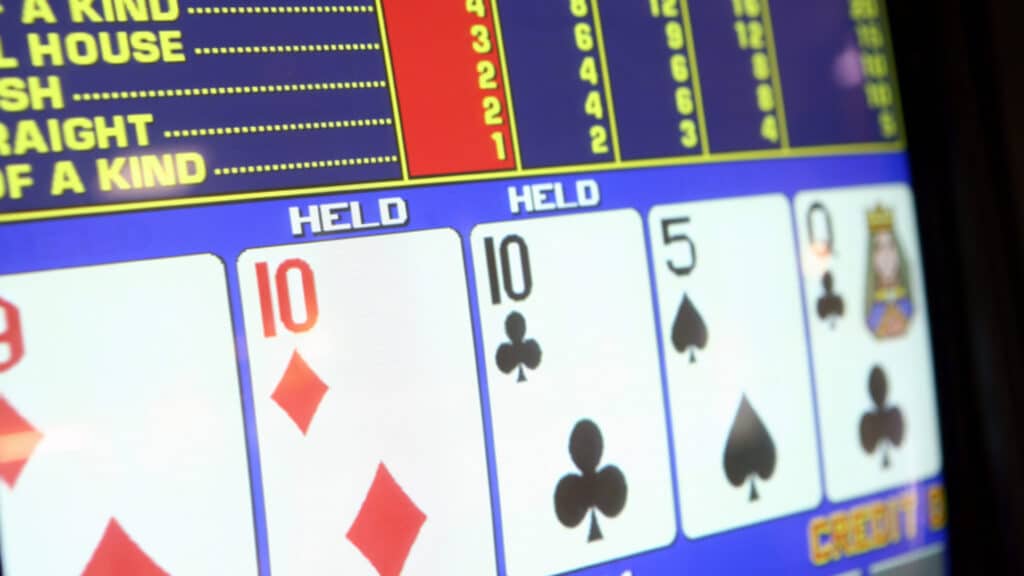Understanding the psychological approaches to online video poker is crucial for players aiming to enhance their enjoyment and play responsibly. Online video poker combines elements of skill and chance, creating a unique gambling experience that engages players on multiple psychological levels. This detailed article explores the key psychological factors at play in online video poker, offering insights for both new and experienced gamblers seeking to navigate this digital casino game more effectively.
The Psychological Allure of Online Video Poker
Online video poker's popularity stems from its blend of accessibility, strategic depth, and the potential for significant payouts. Unlike purely chance-based games like slots, video poker offers a degree of player agency, where decisions impact outcomes. This element of control, even within a framework of chance, is psychologically engaging. The game's fast-paced nature and immediate feedback loops – wins and losses – can be particularly captivating in the online environment.
For many, the appeal lies in the cognitive engagement required. Players must learn poker hand rankings, understand payout tables, and make calculated decisions about which cards to hold and discard. This mental challenge can be intrinsically rewarding, offering a sense of accomplishment beyond just winning money. The online format further enhances accessibility, allowing players to engage anytime, anywhere, adding to its allure.
Cognitive Biases in Video Poker Play
Cognitive biases, systematic patterns of deviation from norm or rationality in judgment, significantly influence how individuals play online video poker. Understanding these biases is the first step towards mitigating their negative impact on decision-making.
- The Illusion of Control: Players may overestimate their ability to influence outcomes in video poker. While strategy is important, the game inherently involves chance due to the random card dealing. This bias can lead to riskier betting and a false sense of security.
- Confirmation Bias: Gamblers might focus on wins and near-wins, remembering instances where their strategy paid off, while downplaying losses or situations where strategy didn't prevent a loss. This selective memory reinforces chosen strategies, even if they are statistically suboptimal.
- Availability Heuristic: Dramatic wins, even if rare, are often more memorable and readily available in memory than routine losses. This can skew perception of actual win frequency and payout sizes, leading to unrealistic expectations and potentially excessive play.
- Gambler's Fallacy: This is the mistaken belief that past events influence future independent events. In video poker, this might manifest as believing that after a series of losses, a win is "due," or conversely, that a winning streak will continue. Each hand is independent, and past results do not predict future outcomes.
- Loss Aversion: The pain of losing is often psychologically stronger than the pleasure of winning the same amount. In video poker, loss aversion can drive players to chase losses, betting more in an attempt to recoup previous losses, often leading to greater financial strain.
Recognizing these biases is not about eliminating them entirely, but developing strategies to counteract their influence on gambling behavior. This involves conscious effort and employing techniques to promote more rational decision-making.
Motivational Factors and Video Poker
Motivation plays a critical role in why individuals engage with online video poker. Understanding these motivations can help players manage their engagement more healthily.
- Financial Incentive: The most obvious motivator is the potential for financial gain. Video poker offers the promise of payouts, which can be a powerful draw, especially for those facing financial pressures or seeking excitement. However, relying solely on video poker as a source of income is highly risky and unsustainable due to the inherent house edge.
- Entertainment and Excitement: For many, video poker is primarily a form of entertainment. The game provides a stimulating experience, with the anticipation of winning hands and the thrill of risk. This entertainment value can be a healthy motivator, provided it remains within controlled limits and does not lead to problem gambling.
- Skill and Mastery: Unlike pure chance games, video poker involves strategy. Players may be motivated by the challenge of mastering the game, improving their strategic play, and making optimal decisions. This pursuit of skill can be a positive motivator, fostering cognitive engagement and learning.
- Social Escape and Distraction: Online video poker can serve as a temporary escape from daily stressors or boredom. The immersive nature of the game and the focus required for strategic play can provide a distraction from real-world problems. However, relying on gambling as a primary coping mechanism can be problematic.
- Social Interaction (Limited in Video Poker): While online video poker is typically a solitary activity, some platforms offer social features like leaderboards or chat functions. For some players, the element of competition or virtual social interaction can be a motivating factor, although this is less pronounced compared to multiplayer poker formats.
It's important for players to reflect on their primary motivations for playing video poker. Are they seeking entertainment, skill development, or financial gains? Aligning motivations with realistic expectations and responsible gambling practices is key to a healthy engagement.
Emotional Regulation and Online Video Poker
Emotions are deeply intertwined with gambling behavior. Online video poker can evoke a range of emotions, and how players manage these emotions significantly impacts their gambling patterns.
- Positive Emotions: Winning hands trigger positive emotions like excitement, joy, and satisfaction. These positive feelings reinforce gameplay and can lead to continued play, seeking to replicate the pleasurable experience. However, over-reliance on gambling for emotional boosts can be detrimental.
- Negative Emotions: Losses, especially consecutive ones, can evoke negative emotions such as frustration, anger, anxiety, and disappointment. Players might gamble more to alleviate these negative feelings, attempting to "win back" losses or escape the discomfort of losing. This emotional chasing of losses is a significant risk factor for problem gambling.
- Mood Congruence: Individuals in a negative mood may be more inclined to engage in risky behaviors, including gambling, as a form of mood repair. Conversely, those in a positive mood might also gamble more, feeling optimistic and overconfident. Both extremes can lead to impulsive and poorly considered gambling decisions.
- Stress and Coping: For some, online video poker becomes a maladaptive coping mechanism for stress, anxiety, or depression. The game offers temporary distraction and escapism, but it does not address the underlying issues and can exacerbate problems in the long run.
- Impulsivity and Emotional Dysregulation: Individuals with higher impulsivity or difficulties in regulating their emotions may be more vulnerable to problem gambling. The immediate gratification offered by video poker can be particularly appealing to those who struggle with delayed gratification and emotional control.
Developing emotional awareness and healthy coping strategies is crucial for responsible online video poker play. Recognizing emotional triggers that lead to impulsive gambling and having alternative coping mechanisms in place can help prevent gambling-related problems.
Strategies, Skills, and Cognitive Engagement
Video poker is not purely a game of chance; skill and strategy play a significant role in maximizing potential returns and minimizing losses. This cognitive element is a key differentiator from many other casino games and appeals to players who enjoy strategic thinking.
- Understanding Optimal Strategy: For each video poker variation (e.g., Jacks or Better, Deuces Wild), there is a mathematically optimal strategy that dictates the best cards to hold for any given hand. Learning and applying these strategies can significantly increase the player's odds and reduce the house edge. Resources like strategy charts and online simulators are invaluable for mastering optimal play.
- Decision-Making Under Uncertainty: Video poker requires making decisions with incomplete information. Players must assess probabilities and potential payouts based on the cards they see and the known probabilities of drawing certain cards. This decision-making process under uncertainty is cognitively stimulating and can be a source of engagement for players who enjoy analytical challenges.
- Cognitive Skills Enhancement: Regular engagement with video poker, particularly when focused on strategic play, can enhance certain cognitive skills. These include:
- Probability Assessment: Estimating the likelihood of different outcomes.
- Decision Analysis: Evaluating options and choosing the most advantageous course of action.
- Pattern Recognition: Identifying favorable card combinations and sequences.
- Working Memory: Holding hand rankings and strategy rules in mind while playing.
- The Role of Practice and Learning: Skill in video poker is developed through practice and learning. Players can improve their strategic play by studying strategy charts, using practice software, and analyzing their own gameplay to identify and correct errors. This learning process can be intrinsically motivating for players who enjoy skill-based games.
- Distinguishing Skill from Chance: While skill reduces the house edge and improves odds, it cannot eliminate the element of chance inherent in card dealing. Even with perfect strategy, losses are inevitable in the short term. Understanding this balance is vital for realistic expectations and responsible gambling.
Focusing on strategy and skill development can enhance the enjoyment of online video poker and potentially improve outcomes. However, it's crucial to remember that even skilled play does not guarantee winnings and responsible bankroll management remains essential.
Risks and Responsible Gambling in Online Video Poker
While online video poker can be an engaging form of entertainment, it's essential to be aware of the potential risks associated with gambling, particularly in the accessible online environment.
- Addiction and Problem Gambling: The addictive nature of gambling is well-documented. Online video poker, with its 24/7 availability and fast-paced play, can be particularly habit-forming for vulnerable individuals. Problem gambling can lead to significant financial, emotional, and social consequences.
- Financial Risks: Uncontrolled gambling can lead to substantial financial losses, debt accumulation, and financial instability. The ease of online transactions can make it easier to overspend and lose track of gambling expenditures.
- Time Management Issues: The accessibility of online video poker can lead to excessive time spent gambling, neglecting other important areas of life such as work, relationships, and personal responsibilities.
- Mental Health Impacts: Problem gambling is often associated with mental health issues such as anxiety, depression, and stress. Gambling can become a maladaptive coping mechanism, exacerbating these conditions over time.
- Accessibility and Online Environment: The online nature of video poker increases accessibility and reduces barriers to entry. This can be particularly risky for individuals with pre-existing vulnerabilities to addiction or those who struggle with self-control.
Responsible gambling practices are paramount for mitigating these risks. This includes setting strict limits on time and money spent gambling, understanding the odds and house edge, recognizing signs of problem gambling, and seeking help if gambling becomes problematic. Resources are available to support responsible gambling and provide assistance for those struggling with gambling addiction.
Tips for Healthy Online Video Poker Engagement
Engaging with online video poker can be a form of entertainment if approached responsibly. Here are some practical tips for maintaining a healthy and balanced approach:
- Set Time and Budget Limits: Before starting to play, decide on a specific time limit and a budget for your session. Stick to these limits strictly, regardless of whether you are winning or losing. Use tools offered by online casinos to set deposit limits and session reminders.
- Play for Entertainment, Not Profit: View video poker as a form of entertainment, with the understanding that it is not a reliable source of income. Avoid chasing losses or gambling with money you cannot afford to lose.
- Learn Optimal Strategy: If you enjoy the strategic aspect of video poker, invest time in learning optimal strategies for the variations you play. This can enhance your enjoyment and improve your odds, but remember it does not guarantee wins.
- Take Regular Breaks: Avoid prolonged gambling sessions. Take frequent breaks to step away from the game, stretch, and engage in other activities. This helps maintain perspective and prevents impulsive play.
- Be Mindful of Emotions: Pay attention to your emotional state while gambling. If you find yourself gambling to cope with negative emotions or chasing losses, take a break and reassess your motivations.
- Use Practice Modes: Many online casinos offer free play or demo modes for video poker. Utilize these to practice strategies and familiarize yourself with the game without risking real money.
- Seek Support if Needed: If you feel your gambling is becoming problematic or impacting your life negatively, seek help. Resources are available for problem gambling, offering support and guidance for individuals and their families.
Conclusion: Navigating the Psychology of Online Video Poker
Online video poker presents a unique intersection of chance, skill, and psychology. By understanding the cognitive biases, motivations, and emotional factors that influence play, gamblers can approach this digital game with greater awareness and control. While the allure of strategy and potential winnings is undeniable, responsible engagement is paramount. Recognizing the risks, practicing mindful play, and utilizing available resources for responsible gambling are essential steps towards enjoying online video poker in a healthy and sustainable manner. Moving forward, continued research into the psychological aspects of online gambling is crucial for developing more effective strategies for prevention and responsible gaming promotion within the evolving digital landscape.
External Resources:



